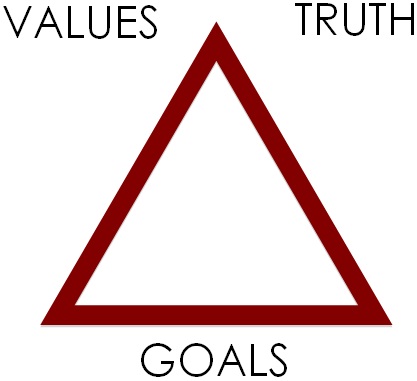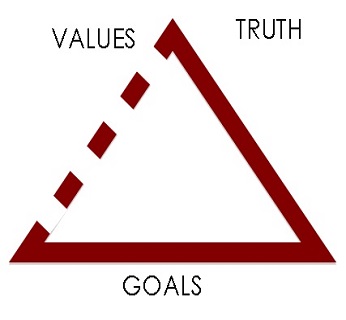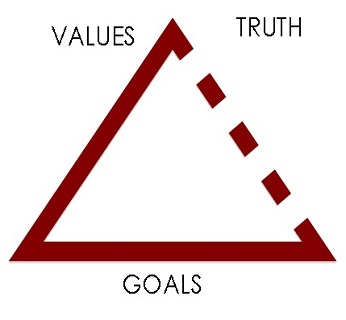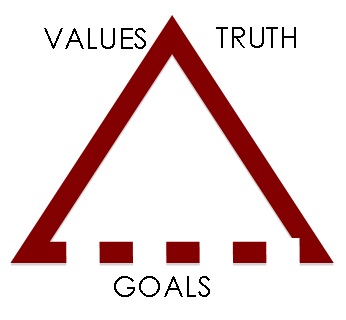A Coaching Model Created by Rebecca Johnson
(Life Coach, UNITED STATES)
The Three Basic Components
Triad of Transformed, Aligned Living
There are three basic components to the TOTAL Coaching Model: Values, Truth, and Goals. When these three components are fully understood and a person walks in complete alignment with their own values, truth, and goals, an individual can completely transform their lives into more than they ever dreamed possible. This total alignment helps people to walk in a way that is true to their values, in understanding what is true about them and the world around them, while in active pursuit of their goals.
As we work toward understanding the TOTAL Coaching Model, we must first fully understand the components of the model. What are values and how do they ultimately apply to an individual’s daily living? How about truth? Is there an ultimate truth? How does a person know what is true for them even if it may not be true for someone else? Finally, how does a person determine what their goals are? What if they don’t have any goals at all?
Hopefully, as you continue reading, you will gain a clearer insight into these questions – and hopefully even more questions are raised!
You have brains in your head. You have feet in your shoes. You can steer yourself in any direction you choose. You’re on your own, and you know what you know. And you are the guy who’ll decide where to go. ~Dr. Seuss
Values
Values are those things we find most important in our lives. These are the things that drive us – that define us. Our values frame our daily decisions.
Values are not typically something that we choose – rather they are shaped as we go throughout our lives. Many times our values are influenced by outside sources as we learn the difference between right and wrong, what is acceptable and what is unacceptable.
Values Show Passion
When we are living in alignment with our values, our passions are more easily highlighted. There is a reason certain circumstances give us greater joy and intrinsic motivation than others – because these circumstances allow us to thrive within our own set of values.
Values Show Personal Perfection
Our values highlight what make life perfect for us. When our values are consistently being carried out in our everyday lives, we have an increased opportunity to feel complete and content in our own shoes.
Values Show Purpose
When we are living in alignment with our values, we can more readily discover a true sense of purpose. Becoming completely clear on what we believe to be the most important aspects of life may help us understand where our energy will be put to best use in order to give us the fulfillment of purposeful living.
Truth
We each operate from day to day working out of basic truths that we have come to believe about ourselves and the world around us. Our beliefs are those things in our lives that we consider to be accurate – whether or not those beliefs are accurate is another thing entirely.
It is important that we operate out of truth and not deception. Not all beliefs are true. As we go through our lives, we pick up information about ourselves and our surroundings. Sometimes the way we interpret that information becomes hindered and we begin to understand in a faulty manner. This is why operating from a place of truth is imperative.
Our Perspective Can Limit Our Understanding
A teenager walking through the supermarket sees a mother with her toddler and twin infants. She sees the mother trying to soothe the crying babies, chase down the toddler to keep him from knocking the merchandise onto the floor, all while attempting to pick up groceries for the evening’s dinner. The teenager walks away with the understanding that motherhood is utterly impossible and there is nothing to be enjoyed about it.
This belief, while interpreted from an eyewitness account, is based off of limited information. The teenager’s new belief about motherhood was untrue. What the teenage girl didn’t get the chance to see is the joy the mother felt when her toddler squeezed her tight and said “I love you mommy.” She didn’t see the happiness that comes from seeing your babies laugh for the very first time. Her viewpoint was quite limited. She couldn’t know the full truth because she couldn’t see the full picture.
The Truth Hurts – But Not As Bad As A Lie
Untrue beliefs can be quite harmful. They can stop us from moving forward or chasing after the things that we need/want in our lives. If we live in a space that has been built around lies, we cannot and will not progress in a healthy and productive manner.
Goals
Our goals are the things in our lives that we are actively working toward. They reflect where we want to be in our lives. The dictionary defines goals as “the object of a person’s ambition or effort.” Goals give our life direction. Goals are different from dreams, wishes, or aspirations. Goals have deadlines.
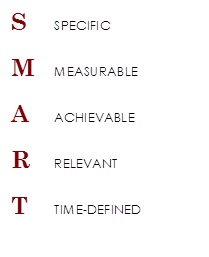 The most effective goals are S.M.A.R.T. goals. They are Specific, meaning the goal has been clearly identified. They are Measurable, thus able to be evaluated to assess progress. They are Achievable therefore are actually within your own capabilities and do not rely on the actions of anyone else. They are Relevant, meaning this goal is actually important to you and you can make it a priority. Finally, they are Time-Defined, having a predetermined deadline.
The most effective goals are S.M.A.R.T. goals. They are Specific, meaning the goal has been clearly identified. They are Measurable, thus able to be evaluated to assess progress. They are Achievable therefore are actually within your own capabilities and do not rely on the actions of anyone else. They are Relevant, meaning this goal is actually important to you and you can make it a priority. Finally, they are Time-Defined, having a predetermined deadline.
The Importance of Full Cooperation
Now that you have a better understanding of values, truth, and goals, let’s see how those three things play a part in the ultimate fulfillment of the individual in their life.
It is vital for all three aspects of the TOTAL Coaching Model to work together. Each component builds off of the others. Values show us what is important. Goals show us what we’re striving for. Truth allows us to see the reality of who we are in the world we live in. If any of these three components are neglected, there are some serious consequences both internally for the client and externally in their life.
We all operate out of these three principles every single day. They may be our own, internally-defined truth, goals, and values – or they may be defined from external forces. The reality is, if we are disconnected from our truth, our values, or our goals, we are connected to someone else’s. We cannot be whole until we are truly connected to and driven from the values, goals, and truth of our own lives.
Your time is limited, so don’t waste it living someone else’s life. Don’t be trapped by dogma – which is living with the results of other people’s thinking. Don’t let the noise of others’ opinions drown out your own inner voice. And most important, have the courage to follow your heart and intuition. ~Steve Jobs
A Life Without Values
If one is not living their life in alignment with their values, they may find that they are experiencing a great deal of dissatisfaction. When living outside of their values, an individual may still be fully aware of and focused on their goals as well as operating under authentic truths in their lives – but they feel a burning inside of them that something is off. Something is just wrong.
As an illustration of this principle, let’s observe the life of Sally. As a social worker, Sally spends her days visiting homes and checking on at-risk children. Because of her massive case-load, she began to fall behind in her scheduled visits. At her supervisor’s request, she started doing phone checks instead of in-home visits in order to save time even though this was against policy. Suddenly, Sally feels a great deal of discontent and guilt about her work. Cheating the system is not something she has ever done before. She feels like she should be doing a better job with protecting the children in her cases, but doesn’t know what else to do. Because Sally is operating outside of her value-system, her level of dissatisfaction continues to rise.
A Life Without Truth
On the other hand, if someone is living their life out of alignment with truth, they are going to experience a whole host of other problems. When living outside of their truth, the client may find themselves operating out of fear (afraid to use the skills they have), stuck in a bad relationship (believing they cannot do any better), or even frustrated with a new position, suddenly feeling in over their head (having accepted a position they were not qualified for).
Let’s look at a scenario where someone is operating out of alignment with what is true. Maria loves her husband and values their relationship. One of her goals is to ensure that they have a healthy marriage. Maria, however, continually battles with the truth that her husband is faithful. She constantly looks for reasons to suggest that he is being unfaithful. He is not, but she is operating out of a place where she cannot grasp the truth. Because Maria is not connected with the truth, her relationship with her husband (value) and the success of her marriage (goal) is suffering.
A Life Without Goals
Clearly, goals are important in one’s life if they expect to have any sense of fulfillment. Goals provide a destination – or a point of arrival. A person without goals is much like a GPS without an ultimate destination: You’ll never know when you have arrived.
Let’s turn our eyes to a situation where someone seems to have everything it takes to make it in the world. John is a well-educated man with many marketable skills. He has had numerous jobs in which he always seems to get great performance reviews. However, he cannot find his path in life. He knows what is important to him and never operates outside of his value system and he is completely aware of the skillset he brings to the table. The trouble is that John does not have any concrete goals in life. He doesn’t know what he wants to be “when he grows up” even though he’s 34. He has bounced from one career to the next with no real path to success. John feels like a kid spinning in circles just waiting for the right opportunity to fall from the sky.
Using TOTAL Living in Coaching
As the coach begins working with the client using the TOTAL Living Coaching model, they must explore the client’s values, goals, and truth before they can begin to align them.
Values
Coach uses their tool of choice to discover their client’s values. Ideally, these should be limited to 5-6 basic values.
Truth
Coach uses various techniques to draw out, clarify, and validate limiting beliefs in the client. Helps client work toward what is true and authentic about who they are, what they have, and where they are going.
Goals
Coach uses S.M.A.R.T. Goals tool to help client discover their long-term goals, then gradually reduces them into smaller, more readily achievable goals.
Throughout the coaching relationship, the coach must be aware of the impact that the client’s values, truth, and goals play in the client’s sense of fulfillment and alignment inside of their life. As the coach, you must be able to recognize the signs that the client is living out of alignment with any of these three aspects of their lives.
Using the TOTAL Coaching Model, the coach is able to help the client develop their own awareness of misalignment and effectively redirect their own actions toward a better alignment toward their values, truth, and goals.
